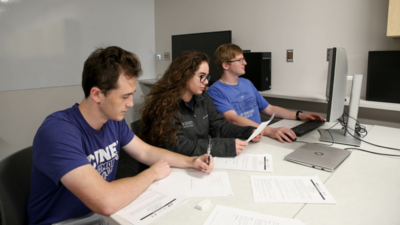A Student's Guide to Registering for Classes

Registering for classes in college can be intimidating, especially if the process is new to you. There are a lot of things to think about, including which classes you should take, how they will fit together in your schedule and whether you will be able to secure a spot in the classes you choose. The goal of this article is to make the registration process stress-free, straightforward and easy for Concordia students to understand.
First, decide which classes you want to take.
This step is more difficult than it sounds, but with some organization and planning, it can be accomplished. Whether or not you have declared a major, you should first factor in required classes. For some students, these classes may be general education requirements; for others, they could be upper-level classes within their program of study.
The best place to find out which classes you need to take is Concordia’s academic course catalog. Here, you can find out the names and read the descriptions of classes that align with your general education and major requirements. Most students choose to take 15-16 credits per semester – this turns out to be around four or five classes and may include music lessons, ensemble credits or labs. Consider these credits, too! Fifteen credits may not seem like a lot, but if two or three of your classes have labs, a significant portion of your time outside of class will be spent in these. It is also a good idea to choose a few backup classes – just in case a class with a lower enrollment limit fills up before you register.
Another issue to consider when deciding which and how many courses to take in a given semester is your commitment outside of class. Are you an athlete or a musician? Do you have an on-campus, or even an off-campus job? These factors can decrease the amount of time you have left to spend on homework significantly. If you find that you are much busier during the fall semester because you play a fall sport, for example, consider taking harder courses or more credits in the spring.
Once class options become visible on the portal, build your schedule.
The Concordia portal is where, once they become visible, students can find information about the upcoming semester’s course offerings, including names of professors, meeting times and places, and course CRN numbers. Students can find courses by navigating to Academic Life > Registration Tools > Look Up Classes. From there, courses can be filtered by term, subject area and other settings.
Make sure that the courses you plan to take do not overlap. Many courses, especially those in the general education department, may have several different sections with alternate meeting times. If you are unsure about how to build your schedule, find that you have two overlapping classes or simply want someone to look over the schedule you built, talk to your academic advisor or first-year coordinator.
When you must prioritize one class over another due to planning for too many credits or finding that two of your courses will overlap, return to the undergraduate course catalog or Concordia’s five-year planned course offerings chart (available on the student portal) and determine when your required courses are offered. In some cases, Concordia only offers certain classes once every two years, which can make them hard to fit in your schedule, especially if you plan to graduate in less than four years. Courses that cycle less often should take top priority when planning.
Collect information needed to register and register for classes!
On the student portal, each course is assigned a unique number called a “CRN.” These are five-digit identifiers that, on the day of registration, you will use to enroll yourself in the correct courses. It is a good idea to write these numbers down before your assigned registration day so that the process of entering them is smoother on the day of.
In addition, make sure to check your class standing on either the student portal or DegreeWorks. Regardless of how many years you have attended Concordia, credits are what counts when it comes to registration – they are what classifies you as a freshman, sophomore, junior or senior. Based on your standing, you will be notified of the day on which you are to register. Your registration window will open at 6 a.m. on that day, so be prepared!
Though the registration period for each semester remains open through the first week of classes, some classes will fill up before this time; therefore, it is usually better to register as close to the opening of the registration window as you can.
Things to remember
As previously mentioned, when in doubt, reach out! Your academic advisor or first-year coordinator, along with professors and staff members are always willing to help. These people are there to help you through any adverse situation that may arise during the registration process. Whether you try to register for a class that fills up, realize that you are missing a particular prerequisite course, or are unsure of your course requirements, there is always someone at Concordia who can assist you in problem-solving.
If you register for classes but realize for any reason that you need to change one or more of the courses on your schedule, don’t panic! The time between your designated registration day and the last day of the add/drop period for a semester is well over two months long – or more if you are registering for the fall semester. There is always ample time for schedule adjustments that take place after registration day.
Class registration can be a complicated process, but it doesn’t have to be confusing. With the right organization, preparation and a little bit of time set aside for the process, it can be stress-free and even fun! If you are a Concordia student about to build a schedule and register for classes for the first time, you may find these tips helpful in completing each of the main steps involved in the course registration process.
Are you interested in studying at Concordia University, Nebraska? Learn more here.
Related Stories


